人教版(PEP)小升初英语语法讲义-第5讲:情态动词(含练习+答案)
文档属性
| 名称 | 人教版(PEP)小升初英语语法讲义-第5讲:情态动词(含练习+答案) |
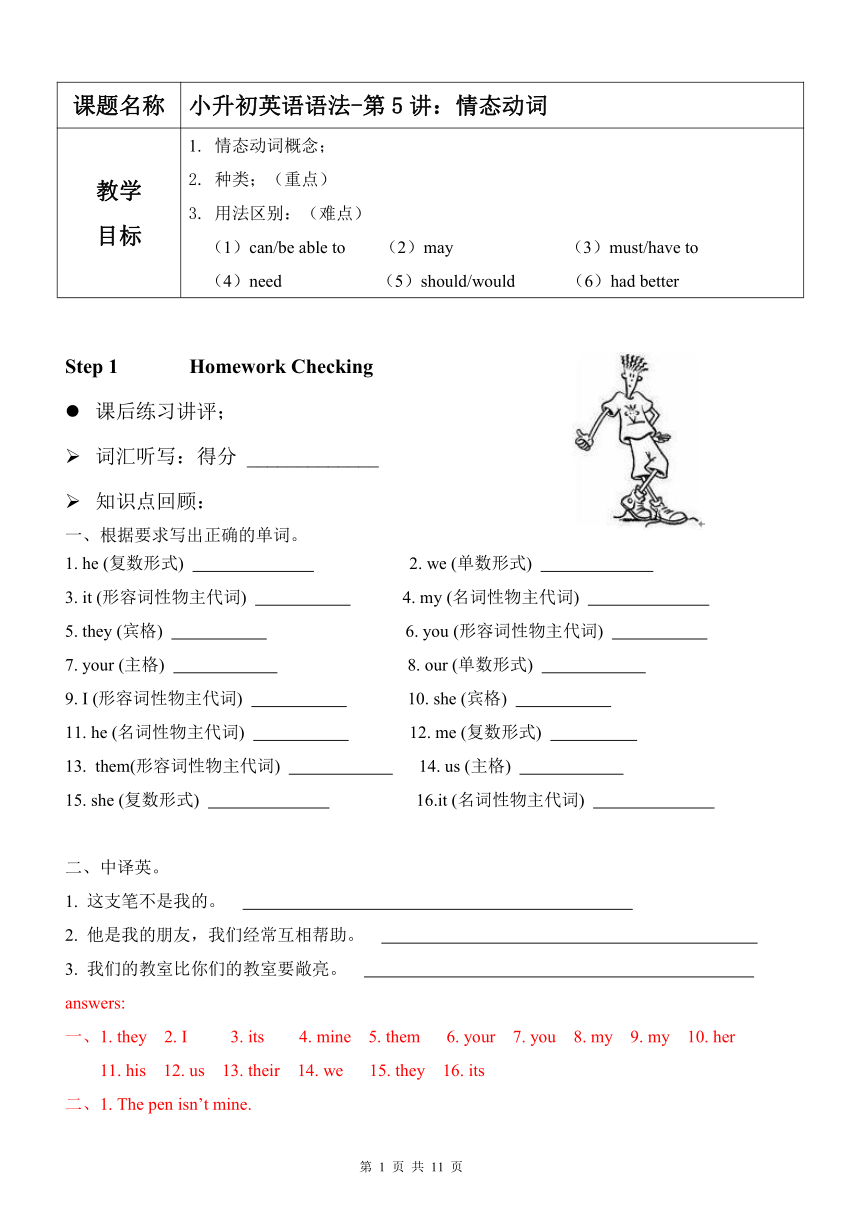
|
|
| 格式 | doc | ||
| 文件大小 | 127.7KB | ||
| 资源类型 | 教案 | ||
| 版本资源 | 人教版(PEP) | ||
| 科目 | 英语 | ||
| 更新时间 | 2020-07-11 00:00:00 | ||
图片预览

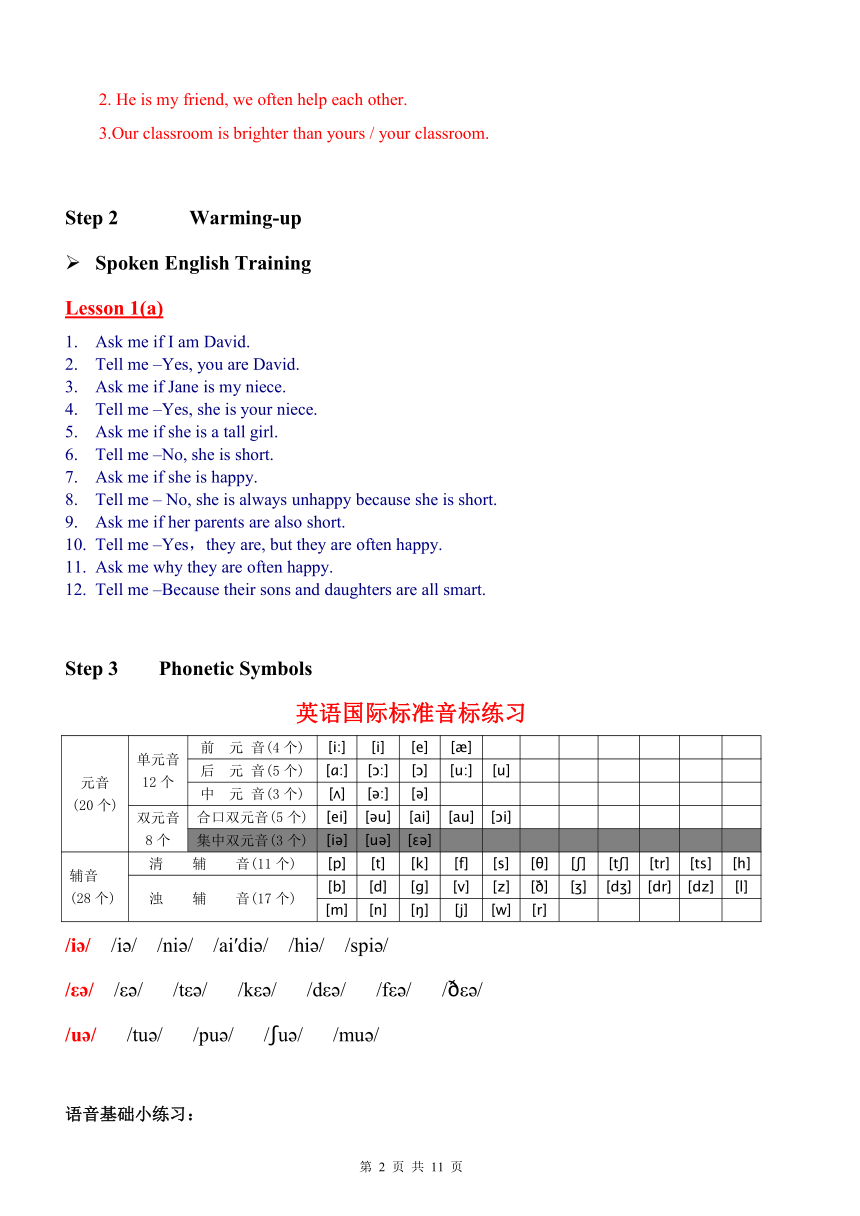
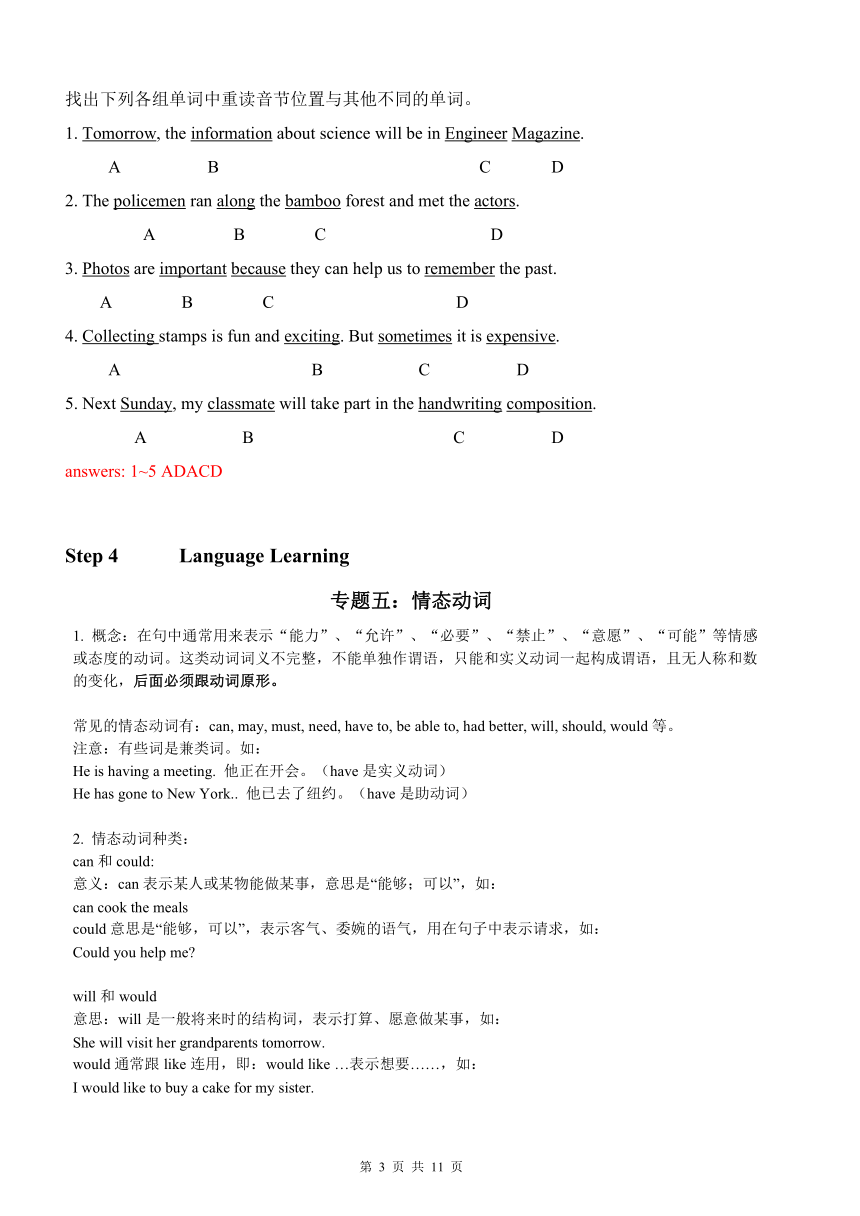
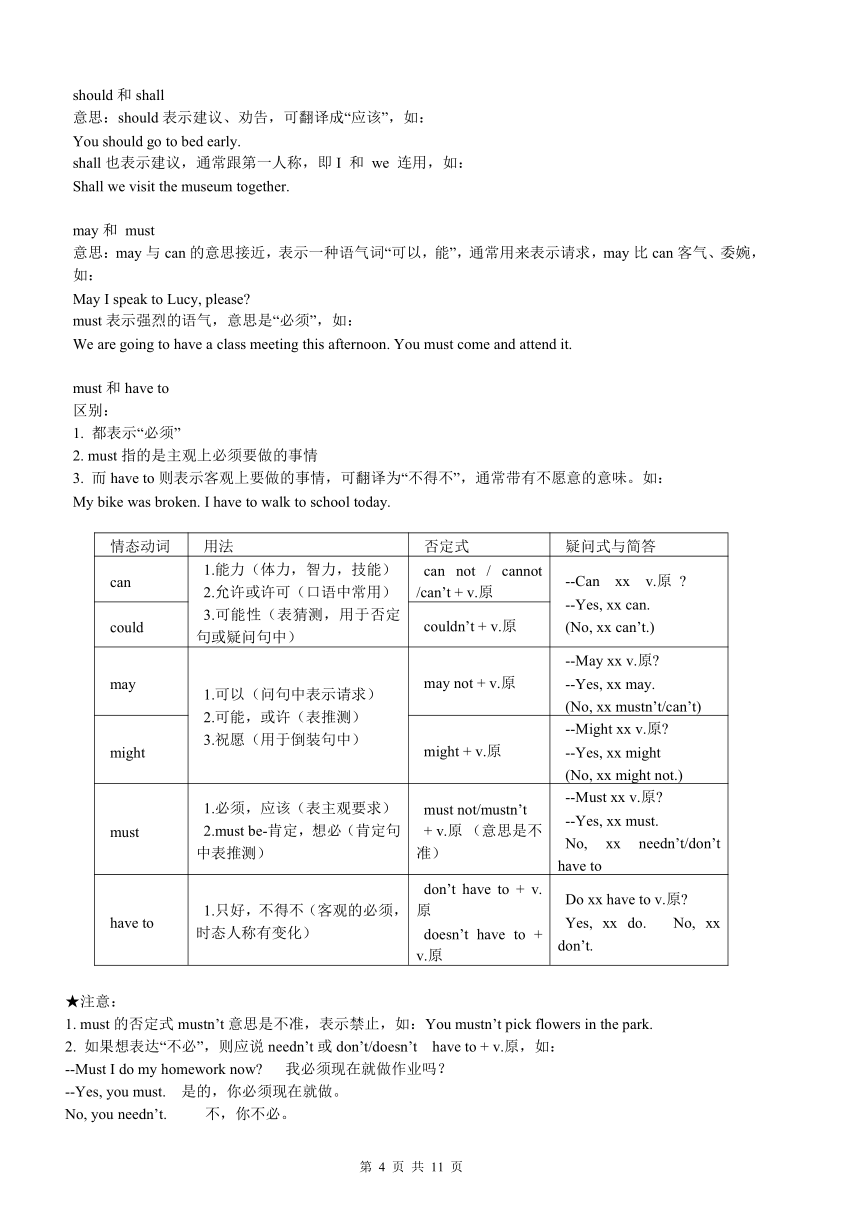
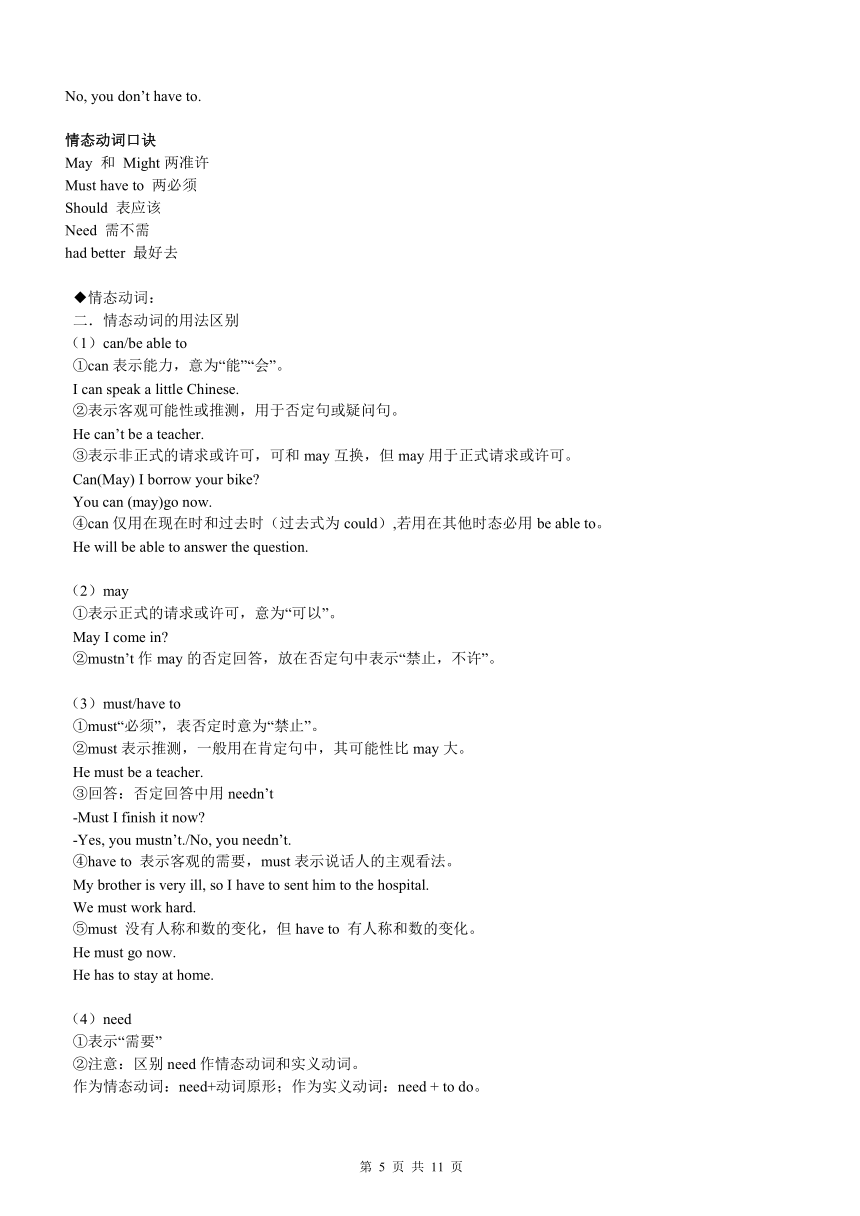
文档简介
课题名称 小升初英语语法-第5讲:情态动词
教学 目标 情态动词概念;
种类;(重点)
用法区别:(难点)
(1)can/be able to (2)may (3)must/have to
(4)need (5)should/would (6)had better
Step 1 Homework Checking
课后练习讲评;
词汇听写:得分 _____________
知识点回顾:
一、根据要求写出正确的单词。
1. he (复数形式) 2. we (单数形式)
3. it (形容词性物主代词) 4. my (名词性物主代词)
5. they (宾格) 6. you (形容词性物主代词)
7. your (主格) 8. our (单数形式)
9. I (形容词性物主代词) 10. she (宾格)
he (名词性物主代词) 12. me (复数形式)
them(形容词性物主代词) 14. us (主格)
15. she (复数形式) 16.it (名词性物主代词)
二、中译英。
1. 这支笔不是我的。
2. 他是我的朋友,我们经常互相帮助。
3. 我们的教室比你们的教室要敞亮。
answers:
一、1. they 2. I 3. its 4. mine 5. them 6. your 7. you 8. my 9. my 10. her
11. his 12. us 13. their 14. we 15. they 16. its
二、1. The pen isn’t mine.
2. He is my friend, we often help each other.
3.Our classroom is brighter than yours / your classroom.
Step 2 Warming-up
Spoken English Training
Lesson 1(a)
Ask me if I am David.
Tell me –Yes, you are David.
Ask me if Jane is my niece.
Tell me –Yes, she is your niece.
Ask me if she is a tall girl.
Tell me –No, she is short.
Ask me if she is happy.
Tell me – No, she is always unhappy because she is short.
Ask me if her parents are also short.
Tell me –Yes,they are, but they are often happy.
Ask me why they are often happy.
Tell me –Because their sons and daughters are all smart.
Step 3 Phonetic Symbols
英语国际标准音标练习
元音 (20个) 单元音12个 前 元 音(4个) [i:] [i] [e] [?]
后 元 音(5个) [ɑ:] [?:] [?] [u:] [u]
中 元 音(3个) [?] [?:] [?]
双元音8个 合口双元音(5个) [ei] [?u] [ai] [au] [?i]
集中双元音(3个) [i?] [u?] [??]
辅音 (28个) 清 辅 音(11个) [p] [t] [k] [f] [s] [θ] [?] [t?] [tr] [ts] [h]
浊 辅 音(17个) [b] [d] [g] [v] [z] [?] [?] [d?] [dr] [dz] [l]
[m] [n] [?] [j] [w] [r]
/i?/ /i?/ /ni?/ /ai′di?/ /hi?/ /spi?/
/ε?/ /ε?/ /tε?/ /kε?/ /dε?/ /fε?/ /?ε?/
/u?/ /tu?/ /pu?/ /?u?/ /mu?/
语音基础小练习:
找出下列各组单词中重读音节位置与其他不同的单词。
1. Tomorrow, the information about science will be in Engineer Magazine.
A B C D
2. The policemen ran along the bamboo forest and met the actors.
A B C D
3. Photos are important because they can help us to remember the past.
A B C D
4. Collecting stamps is fun and exciting. But sometimes it is expensive.
A B C D
5. Next Sunday, my classmate will take part in the handwriting composition.
A B C D
answers: 1~5 ADACD
Step 4 Language Learning
专题五:情态动词
1. 概念:在句中通常用来表示“能力”、“允许”、“必要”、“禁止”、“意愿”、“可能”等情感或态度的动词。这类动词词义不完整,不能单独作谓语,只能和实义动词一起构成谓语,且无人称和数的变化,后面必须跟动词原形。
常见的情态动词有:can, may, must, need, have to, be able to, had better, will, should, would等。
注意:有些词是兼类词。如:
He is having a meeting. 他正在开会。(have是实义动词)
He has gone to New York.. 他已去了纽约。(have是助动词)
2. 情态动词种类:
can和could:
意义:can表示某人或某物能做某事,意思是“能够;可以”,如:
can cook the meals
could意思是“能够,可以”,表示客气、委婉的语气,用在句子中表示请求,如:
Could you help me?
will和would
意思:will是一般将来时的结构词,表示打算、愿意做某事,如:
She will visit her grandparents tomorrow.
would通常跟like连用,即:would like …表示想要……,如:
I would like to buy a cake for my sister.
should和shall
意思:should表示建议、劝告,可翻译成“应该”,如:
You should go to bed early.
shall也表示建议,通常跟第一人称,即I 和 we 连用,如:
Shall we visit the museum together.
may和 must
意思:may与can的意思接近,表示一种语气词“可以,能”,通常用来表示请求,may比can客气、委婉,如:
May I speak to Lucy, please?
must表示强烈的语气,意思是“必须”,如:
We are going to have a class meeting this afternoon. You must come and attend it.
must和have to
区别:
1. 都表示“必须”
2. must指的是主观上必须要做的事情
3. 而have to则表示客观上要做的事情,可翻译为“不得不”,通常带有不愿意的意味。如:
My bike was broken. I have to walk to school today.
情态动词 用法 否定式 疑问式与简答
can 1.能力(体力,智力,技能)
2.允许或许可(口语中常用)
3.可能性(表猜测,用于否定句或疑问句中) can not / cannot /can’t + v.原 --Can xx v.原 ?
--Yes, xx can.
(No, xx can’t.)
could
couldn’t + v.原
may 1.可以(问句中表示请求)
2.可能,或许(表推测)
3.祝愿(用于倒装句中) may not + v.原 --May xx v.原?
--Yes, xx may.
(No, xx mustn’t/can’t)
might
might + v.原 --Might xx v.原?
--Yes, xx might
(No, xx might not.)
must 1.必须,应该(表主观要求)
2.must be-肯定,想必(肯定句中表推测) must not/mustn’t
+ v.原 (意思是不准) --Must xx v.原?
--Yes, xx must.
No, xx needn’t/don’t have to
have to 1.只好,不得不(客观的必须,时态人称有变化) don’t have to + v.原
doesn’t have to + v.原 Do xx have to v.原?
Yes, xx do. No, xx don’t.
★注意:
1. must的否定式mustn’t意思是不准,表示禁止,如:You mustn’t pick flowers in the park.
2. 如果想表达“不必”,则应说needn’t或don’t/doesn’t have to + v.原,如:
--Must I do my homework now? 我必须现在就做作业吗?
--Yes, you must. 是的,你必须现在就做。
No, you needn’t. 不,你不必。
No, you don’t have to.
情态动词口诀
May 和 Might两准许
Must have to 两必须
Should 表应该
Need 需不需
had better 最好去
◆情态动词:
二.情态动词的用法区别
(1)can/be able to
①can表示能力,意为“能”“会”。
I can speak a little Chinese.
②表示客观可能性或推测,用于否定句或疑问句。
He can’t be a teacher.
③表示非正式的请求或许可,可和may互换,但may用于正式请求或许可。
Can(May) I borrow your bike?
You can (may)go now.
④can仅用在现在时和过去时(过去式为could),若用在其他时态必用be able to。
He will be able to answer the question.
(2)may
①表示正式的请求或许可,意为“可以”。
May I come in?
②mustn’t作may的否定回答,放在否定句中表示“禁止,不许”。
(3)must/have to
①must“必须”,表否定时意为“禁止”。
②must表示推测,一般用在肯定句中,其可能性比may大。
He must be a teacher.
③回答:否定回答中用needn’t
-Must I finish it now?
-Yes, you mustn’t./No, you needn’t.
④have to 表示客观的需要,must表示说话人的主观看法。
My brother is very ill, so I have to sent him to the hospital.
We must work hard.
⑤must 没有人称和数的变化,但have to 有人称和数的变化。
He must go now.
He has to stay at home.
(4)need
①表示“需要”
②注意:区别need作情态动词和实义动词。
作为情态动词:need+动词原形;作为实义动词:need + to do。
(5)should/would
shall(should)为“应该”,will(would)为“意愿”。
We should study hard for our country.
He would like a cup of tea.
(6)had better
①表示“最好”,相当于助动词,只有一种形式,后面跟动词的原形。即:had better do sth.
It is cold outside. You’d better put on your coat.
②注意它的否定形式:直接在后面加not,再接动词原形。即:had better not do sth.
You’d better not smoke. It’s bad for your health.
【小升初真题演练】
(1). ( ) --- ________ I have a look at the picture? ---Yes, you ___________.
A. Can, must B. Can, may C. May, can D. Must, must
(2). ( ) Must I borrow the book with an ID card? No, you .
A. mustn’t B. needn’t C. shouldn’t
(3). ( ) ---May I _____ your bike???---Sure.
A. ride? ? B. riding? ? C. read? ? D. to ride
(4). ( ) Mr. Arthur can _____ piano.
A. played the? ? B. played? ? C. plays the? ? D. play the
answers: 1~4 CBAD
【课堂练习】
精点精练
一、根据实际情况回答下列问题;
⑴What can a rabbit do?
⑵Can you clean your bedroom?
⑶Can dogs swim?
⑷Who can run faster, you or your friend?
⑸What can you do in winter?
⑹Can a bird fly in the sky?
answers: 1. A rabbit / it can jump. 2. Yes, I can. / No, I can’t.
3. Yes, they can. 4. I / My friend can run faster.
5. I can make a snowman. 6. Yes, it can.
二、选择
( )1.A: you do me a favour?
B: Of course.
A. Can B. Must C. Do
( )2.A: you a cup of coffee? --- B: Yes, thank you.
A. Like, would B. Do, like C. Would, like
( )3.A: May I have ice water? --- B: Sure, here you are.
A. any B. an C. some
( )4.The kid is so young that she read and write.
A. can B. can’t C. is
( )5.Monkeys can .
A. wings B. swing C. swinging
( )6.Some robots can .
A. sing and dance B. does homework C. watching TV
( )7.A: I have a look at your book? --- B: Certainly.
A. May B. Would C. Do
( )8.It is so late. I go home now.
A. must B. can C. may
( )9.John’s mother is ill. He stay at home and take care of her.
A. must B. has to C. can
( )10. A: _______ I take some photos here? --- B: No, you _______.
A. May, needn’t B. Must, mustn’t C. Can, mustn’t
answers: 1~5 ACCBB 6~10 AAABC
模拟预测
一、用所给的情态动词填空(不能重复使用)
can’t must shouldn’t won’t needn’t
⑴. You ________ read in bed. It’s bad for your eyes.
⑵. You ________ show your ticket to the man at the gate of the zoo.
⑶. You ________ show your library card when you return the book.
⑷. I’m sorry, but you ________ use my bike this afternoon. I’m using it this afternoon.
⑸. He ________ come to school today. He is ill in the hospital.
二、选择题。
( )(1).We are so thirsty. we have some tea, please?
A. Could B. Would C. Must
( )(2).A: Can your brother do housework? B: .
A. Yes, he does. B. No, he can. C. Yes, he can.
( )(3).I some chicken, please.
A. like B. would like C. would
( )(4). I chicken very much.
A. like B. would like C. would
( )(5).The man looks old. He 50 years old.
A. must be B. is C. must
( )(6).A:Can tigers run and jump? B: .
A. No, it can’t. B. Yes, they can. C. Yes, it can.
( ) (7). Must I finish my homework now?---No, you _______.
A. needn’t B. mustn’t C. can’t
( ) (8) We ______ listen to the teacher carefully in class.
A. can B. should C. would
( ) (9) Shall I get one more egg for you, Mum?---Thanks, but you _____, I’ve had enough.
A. may not B. must not C. needn’t
( ) (10) You ______ be late for school again next time.
A. aren’t B. can’t C. shan’t
answers:
一、1. shouldn’t 2. must 3. needn’t 4. can’t 5. won’t
二、1~5 ACBAA 6~10 BABCB
Homework:
温习本堂课所学知识;
词汇短语听写 ;
小升初模拟题练习:
一、根据题目要求完成句子(每条横线不限字数,每小题1 分,共5 分)
1. Tom has breakfast at home. (改为否定句)
Tom ________________ breakfast at home.
2. Spring lasts for three months. (就划线部分提问)
_____________________ spring____________?
3. Henry did his homework carefully last night.(改为一般疑问句)
_______ he ______ his homework carefully last night?
4. A toy car is not as expensive as a toy plane. (改为同意句)
A toy car is ___________________ a toy plane
5. She is taller than any other student in his class. (改为同意句)
She is __________________________ student in his class.
二、用括号内所给词的正确形式填空 (每小题1 分,共10分)
Be careful! The bus ______________________ (come).
She ____________________(not play) the game well.
Tom hates maths, because maths is his _______(bad) subject of all.
The ____________ (fire) is putting out the fire..
Do you know the _____________(mean) of the word?
Can you tell me the ______________(different) between “pay” and “cost”?
It snowed ______________(heavy) last night.
How many ______________(shelf) are there in a cupboard?
My grandmother has only two _______ (tooth) left.
Shh! The baby _______________ (sleep) next door.
三、根据所给词的首字母及文章提示,在横线上填入适当的单词使短文完整。(每空0.5分,共5分)
Christmas is a very busy time for everyone. People send cards to their relatives and friends. They make their houses pretty. People also buy presents for everyone in the family. They put them under the tree.
In many c 1 ,Christmas is one of the most important festivals of the year. Christmas Day is on D 2 25th. In some countries, Father Christmas brings p 3 to all good children on Christmas Eve. He rides through the sky with a big bag of presents. He can t 4 all over the world in one night. O 5 that night, children are very excited and sometimes a bit
n 6 . Often parents say, “If you are naughty, Father Christmas might not come. Remember! He only c 7 to visit good children.” That makes them quiet again! B 8 they go to bed, they leave s 9 by the fire for Father Christmas to eat and drink. Then they each put a s 10 to the bottom of their beds.
四、找出下列句子的错误并在横线上改正:每小题1 分,共5 分
1,When did you go to home yesterday?
A B C D
2,She always late for school.
A B C D
3,Which subject do you like best, English or Chinese?
A B C D
4,Not open the door , please.
A B C D
5, Do you like play chess?
A B C D
五、完型填空。(10%)
In old times, a king puts a big rock 1 the road. Many people pass by and 2 around it. 3 of them say, “The king is not good. He doesn’t keep the road 4 .” But no one gets the big rock 5 of the way.
A farmer comes. He carries a lot of 6 . He puts down his vegetables and 7 to get the big rock out of the way. After a few 8 , he does it. Then he finds some 9 and a note under the rock. The note says, “The money is 10 you, because you do well.”
( ) 1. A. in B. at C. on D. with
( ) 2. A. walk B. climb C. play D. put
( ) 3. A. Other B. Most C. Each D. Both
( ) 4. A. dirty B. quiet C. clear D. white
( ) 5. A. in B. out C. away D. far
( ) 6. A. fruit B. food C. drinks D. vegetables
( ) 7. A. can B. may C. tries D. takes
( ) 8. A. minutes B. days C. months D. years
( ) 9. A. food B. apples C. trees D. money
( ) 10. A. to B. for C. with D. by
answers:
一、1. doesn’t have 2. How long does, last 3. Did … do
4. cheaper than 5. the tallest
二、1. is coming 2. doesn’t / didn’t play 3. worst 4. fireman 5. meaning
6. difference 7. heavily 8. shelves 9. teeth 10. is sleeping
三、1. countries 2. December 3. presents 4. travel 5. On
6. naughty 7. comes 8. Before 9. something 10. stocking
四、1,C go home 2, A is always 3, C better
4, A Don’t 5, C playing
五、1~5 C A B C B 6~10 D C A D B
第 11 页 共 11 页
教学 目标 情态动词概念;
种类;(重点)
用法区别:(难点)
(1)can/be able to (2)may (3)must/have to
(4)need (5)should/would (6)had better
Step 1 Homework Checking
课后练习讲评;
词汇听写:得分 _____________
知识点回顾:
一、根据要求写出正确的单词。
1. he (复数形式) 2. we (单数形式)
3. it (形容词性物主代词) 4. my (名词性物主代词)
5. they (宾格) 6. you (形容词性物主代词)
7. your (主格) 8. our (单数形式)
9. I (形容词性物主代词) 10. she (宾格)
he (名词性物主代词) 12. me (复数形式)
them(形容词性物主代词) 14. us (主格)
15. she (复数形式) 16.it (名词性物主代词)
二、中译英。
1. 这支笔不是我的。
2. 他是我的朋友,我们经常互相帮助。
3. 我们的教室比你们的教室要敞亮。
answers:
一、1. they 2. I 3. its 4. mine 5. them 6. your 7. you 8. my 9. my 10. her
11. his 12. us 13. their 14. we 15. they 16. its
二、1. The pen isn’t mine.
2. He is my friend, we often help each other.
3.Our classroom is brighter than yours / your classroom.
Step 2 Warming-up
Spoken English Training
Lesson 1(a)
Ask me if I am David.
Tell me –Yes, you are David.
Ask me if Jane is my niece.
Tell me –Yes, she is your niece.
Ask me if she is a tall girl.
Tell me –No, she is short.
Ask me if she is happy.
Tell me – No, she is always unhappy because she is short.
Ask me if her parents are also short.
Tell me –Yes,they are, but they are often happy.
Ask me why they are often happy.
Tell me –Because their sons and daughters are all smart.
Step 3 Phonetic Symbols
英语国际标准音标练习
元音 (20个) 单元音12个 前 元 音(4个) [i:] [i] [e] [?]
后 元 音(5个) [ɑ:] [?:] [?] [u:] [u]
中 元 音(3个) [?] [?:] [?]
双元音8个 合口双元音(5个) [ei] [?u] [ai] [au] [?i]
集中双元音(3个) [i?] [u?] [??]
辅音 (28个) 清 辅 音(11个) [p] [t] [k] [f] [s] [θ] [?] [t?] [tr] [ts] [h]
浊 辅 音(17个) [b] [d] [g] [v] [z] [?] [?] [d?] [dr] [dz] [l]
[m] [n] [?] [j] [w] [r]
/i?/ /i?/ /ni?/ /ai′di?/ /hi?/ /spi?/
/ε?/ /ε?/ /tε?/ /kε?/ /dε?/ /fε?/ /?ε?/
/u?/ /tu?/ /pu?/ /?u?/ /mu?/
语音基础小练习:
找出下列各组单词中重读音节位置与其他不同的单词。
1. Tomorrow, the information about science will be in Engineer Magazine.
A B C D
2. The policemen ran along the bamboo forest and met the actors.
A B C D
3. Photos are important because they can help us to remember the past.
A B C D
4. Collecting stamps is fun and exciting. But sometimes it is expensive.
A B C D
5. Next Sunday, my classmate will take part in the handwriting composition.
A B C D
answers: 1~5 ADACD
Step 4 Language Learning
专题五:情态动词
1. 概念:在句中通常用来表示“能力”、“允许”、“必要”、“禁止”、“意愿”、“可能”等情感或态度的动词。这类动词词义不完整,不能单独作谓语,只能和实义动词一起构成谓语,且无人称和数的变化,后面必须跟动词原形。
常见的情态动词有:can, may, must, need, have to, be able to, had better, will, should, would等。
注意:有些词是兼类词。如:
He is having a meeting. 他正在开会。(have是实义动词)
He has gone to New York.. 他已去了纽约。(have是助动词)
2. 情态动词种类:
can和could:
意义:can表示某人或某物能做某事,意思是“能够;可以”,如:
can cook the meals
could意思是“能够,可以”,表示客气、委婉的语气,用在句子中表示请求,如:
Could you help me?
will和would
意思:will是一般将来时的结构词,表示打算、愿意做某事,如:
She will visit her grandparents tomorrow.
would通常跟like连用,即:would like …表示想要……,如:
I would like to buy a cake for my sister.
should和shall
意思:should表示建议、劝告,可翻译成“应该”,如:
You should go to bed early.
shall也表示建议,通常跟第一人称,即I 和 we 连用,如:
Shall we visit the museum together.
may和 must
意思:may与can的意思接近,表示一种语气词“可以,能”,通常用来表示请求,may比can客气、委婉,如:
May I speak to Lucy, please?
must表示强烈的语气,意思是“必须”,如:
We are going to have a class meeting this afternoon. You must come and attend it.
must和have to
区别:
1. 都表示“必须”
2. must指的是主观上必须要做的事情
3. 而have to则表示客观上要做的事情,可翻译为“不得不”,通常带有不愿意的意味。如:
My bike was broken. I have to walk to school today.
情态动词 用法 否定式 疑问式与简答
can 1.能力(体力,智力,技能)
2.允许或许可(口语中常用)
3.可能性(表猜测,用于否定句或疑问句中) can not / cannot /can’t + v.原 --Can xx v.原 ?
--Yes, xx can.
(No, xx can’t.)
could
couldn’t + v.原
may 1.可以(问句中表示请求)
2.可能,或许(表推测)
3.祝愿(用于倒装句中) may not + v.原 --May xx v.原?
--Yes, xx may.
(No, xx mustn’t/can’t)
might
might + v.原 --Might xx v.原?
--Yes, xx might
(No, xx might not.)
must 1.必须,应该(表主观要求)
2.must be-肯定,想必(肯定句中表推测) must not/mustn’t
+ v.原 (意思是不准) --Must xx v.原?
--Yes, xx must.
No, xx needn’t/don’t have to
have to 1.只好,不得不(客观的必须,时态人称有变化) don’t have to + v.原
doesn’t have to + v.原 Do xx have to v.原?
Yes, xx do. No, xx don’t.
★注意:
1. must的否定式mustn’t意思是不准,表示禁止,如:You mustn’t pick flowers in the park.
2. 如果想表达“不必”,则应说needn’t或don’t/doesn’t have to + v.原,如:
--Must I do my homework now? 我必须现在就做作业吗?
--Yes, you must. 是的,你必须现在就做。
No, you needn’t. 不,你不必。
No, you don’t have to.
情态动词口诀
May 和 Might两准许
Must have to 两必须
Should 表应该
Need 需不需
had better 最好去
◆情态动词:
二.情态动词的用法区别
(1)can/be able to
①can表示能力,意为“能”“会”。
I can speak a little Chinese.
②表示客观可能性或推测,用于否定句或疑问句。
He can’t be a teacher.
③表示非正式的请求或许可,可和may互换,但may用于正式请求或许可。
Can(May) I borrow your bike?
You can (may)go now.
④can仅用在现在时和过去时(过去式为could),若用在其他时态必用be able to。
He will be able to answer the question.
(2)may
①表示正式的请求或许可,意为“可以”。
May I come in?
②mustn’t作may的否定回答,放在否定句中表示“禁止,不许”。
(3)must/have to
①must“必须”,表否定时意为“禁止”。
②must表示推测,一般用在肯定句中,其可能性比may大。
He must be a teacher.
③回答:否定回答中用needn’t
-Must I finish it now?
-Yes, you mustn’t./No, you needn’t.
④have to 表示客观的需要,must表示说话人的主观看法。
My brother is very ill, so I have to sent him to the hospital.
We must work hard.
⑤must 没有人称和数的变化,但have to 有人称和数的变化。
He must go now.
He has to stay at home.
(4)need
①表示“需要”
②注意:区别need作情态动词和实义动词。
作为情态动词:need+动词原形;作为实义动词:need + to do。
(5)should/would
shall(should)为“应该”,will(would)为“意愿”。
We should study hard for our country.
He would like a cup of tea.
(6)had better
①表示“最好”,相当于助动词,只有一种形式,后面跟动词的原形。即:had better do sth.
It is cold outside. You’d better put on your coat.
②注意它的否定形式:直接在后面加not,再接动词原形。即:had better not do sth.
You’d better not smoke. It’s bad for your health.
【小升初真题演练】
(1). ( ) --- ________ I have a look at the picture? ---Yes, you ___________.
A. Can, must B. Can, may C. May, can D. Must, must
(2). ( ) Must I borrow the book with an ID card? No, you .
A. mustn’t B. needn’t C. shouldn’t
(3). ( ) ---May I _____ your bike???---Sure.
A. ride? ? B. riding? ? C. read? ? D. to ride
(4). ( ) Mr. Arthur can _____ piano.
A. played the? ? B. played? ? C. plays the? ? D. play the
answers: 1~4 CBAD
【课堂练习】
精点精练
一、根据实际情况回答下列问题;
⑴What can a rabbit do?
⑵Can you clean your bedroom?
⑶Can dogs swim?
⑷Who can run faster, you or your friend?
⑸What can you do in winter?
⑹Can a bird fly in the sky?
answers: 1. A rabbit / it can jump. 2. Yes, I can. / No, I can’t.
3. Yes, they can. 4. I / My friend can run faster.
5. I can make a snowman. 6. Yes, it can.
二、选择
( )1.A: you do me a favour?
B: Of course.
A. Can B. Must C. Do
( )2.A: you a cup of coffee? --- B: Yes, thank you.
A. Like, would B. Do, like C. Would, like
( )3.A: May I have ice water? --- B: Sure, here you are.
A. any B. an C. some
( )4.The kid is so young that she read and write.
A. can B. can’t C. is
( )5.Monkeys can .
A. wings B. swing C. swinging
( )6.Some robots can .
A. sing and dance B. does homework C. watching TV
( )7.A: I have a look at your book? --- B: Certainly.
A. May B. Would C. Do
( )8.It is so late. I go home now.
A. must B. can C. may
( )9.John’s mother is ill. He stay at home and take care of her.
A. must B. has to C. can
( )10. A: _______ I take some photos here? --- B: No, you _______.
A. May, needn’t B. Must, mustn’t C. Can, mustn’t
answers: 1~5 ACCBB 6~10 AAABC
模拟预测
一、用所给的情态动词填空(不能重复使用)
can’t must shouldn’t won’t needn’t
⑴. You ________ read in bed. It’s bad for your eyes.
⑵. You ________ show your ticket to the man at the gate of the zoo.
⑶. You ________ show your library card when you return the book.
⑷. I’m sorry, but you ________ use my bike this afternoon. I’m using it this afternoon.
⑸. He ________ come to school today. He is ill in the hospital.
二、选择题。
( )(1).We are so thirsty. we have some tea, please?
A. Could B. Would C. Must
( )(2).A: Can your brother do housework? B: .
A. Yes, he does. B. No, he can. C. Yes, he can.
( )(3).I some chicken, please.
A. like B. would like C. would
( )(4). I chicken very much.
A. like B. would like C. would
( )(5).The man looks old. He 50 years old.
A. must be B. is C. must
( )(6).A:Can tigers run and jump? B: .
A. No, it can’t. B. Yes, they can. C. Yes, it can.
( ) (7). Must I finish my homework now?---No, you _______.
A. needn’t B. mustn’t C. can’t
( ) (8) We ______ listen to the teacher carefully in class.
A. can B. should C. would
( ) (9) Shall I get one more egg for you, Mum?---Thanks, but you _____, I’ve had enough.
A. may not B. must not C. needn’t
( ) (10) You ______ be late for school again next time.
A. aren’t B. can’t C. shan’t
answers:
一、1. shouldn’t 2. must 3. needn’t 4. can’t 5. won’t
二、1~5 ACBAA 6~10 BABCB
Homework:
温习本堂课所学知识;
词汇短语听写 ;
小升初模拟题练习:
一、根据题目要求完成句子(每条横线不限字数,每小题1 分,共5 分)
1. Tom has breakfast at home. (改为否定句)
Tom ________________ breakfast at home.
2. Spring lasts for three months. (就划线部分提问)
_____________________ spring____________?
3. Henry did his homework carefully last night.(改为一般疑问句)
_______ he ______ his homework carefully last night?
4. A toy car is not as expensive as a toy plane. (改为同意句)
A toy car is ___________________ a toy plane
5. She is taller than any other student in his class. (改为同意句)
She is __________________________ student in his class.
二、用括号内所给词的正确形式填空 (每小题1 分,共10分)
Be careful! The bus ______________________ (come).
She ____________________(not play) the game well.
Tom hates maths, because maths is his _______(bad) subject of all.
The ____________ (fire) is putting out the fire..
Do you know the _____________(mean) of the word?
Can you tell me the ______________(different) between “pay” and “cost”?
It snowed ______________(heavy) last night.
How many ______________(shelf) are there in a cupboard?
My grandmother has only two _______ (tooth) left.
Shh! The baby _______________ (sleep) next door.
三、根据所给词的首字母及文章提示,在横线上填入适当的单词使短文完整。(每空0.5分,共5分)
Christmas is a very busy time for everyone. People send cards to their relatives and friends. They make their houses pretty. People also buy presents for everyone in the family. They put them under the tree.
In many c 1 ,Christmas is one of the most important festivals of the year. Christmas Day is on D 2 25th. In some countries, Father Christmas brings p 3 to all good children on Christmas Eve. He rides through the sky with a big bag of presents. He can t 4 all over the world in one night. O 5 that night, children are very excited and sometimes a bit
n 6 . Often parents say, “If you are naughty, Father Christmas might not come. Remember! He only c 7 to visit good children.” That makes them quiet again! B 8 they go to bed, they leave s 9 by the fire for Father Christmas to eat and drink. Then they each put a s 10 to the bottom of their beds.
四、找出下列句子的错误并在横线上改正:每小题1 分,共5 分
1,When did you go to home yesterday?
A B C D
2,She always late for school.
A B C D
3,Which subject do you like best, English or Chinese?
A B C D
4,Not open the door , please.
A B C D
5, Do you like play chess?
A B C D
五、完型填空。(10%)
In old times, a king puts a big rock 1 the road. Many people pass by and 2 around it. 3 of them say, “The king is not good. He doesn’t keep the road 4 .” But no one gets the big rock 5 of the way.
A farmer comes. He carries a lot of 6 . He puts down his vegetables and 7 to get the big rock out of the way. After a few 8 , he does it. Then he finds some 9 and a note under the rock. The note says, “The money is 10 you, because you do well.”
( ) 1. A. in B. at C. on D. with
( ) 2. A. walk B. climb C. play D. put
( ) 3. A. Other B. Most C. Each D. Both
( ) 4. A. dirty B. quiet C. clear D. white
( ) 5. A. in B. out C. away D. far
( ) 6. A. fruit B. food C. drinks D. vegetables
( ) 7. A. can B. may C. tries D. takes
( ) 8. A. minutes B. days C. months D. years
( ) 9. A. food B. apples C. trees D. money
( ) 10. A. to B. for C. with D. by
answers:
一、1. doesn’t have 2. How long does, last 3. Did … do
4. cheaper than 5. the tallest
二、1. is coming 2. doesn’t / didn’t play 3. worst 4. fireman 5. meaning
6. difference 7. heavily 8. shelves 9. teeth 10. is sleeping
三、1. countries 2. December 3. presents 4. travel 5. On
6. naughty 7. comes 8. Before 9. something 10. stocking
四、1,C go home 2, A is always 3, C better
4, A Don’t 5, C playing
五、1~5 C A B C B 6~10 D C A D B
第 11 页 共 11 页
